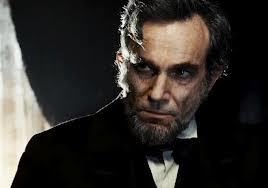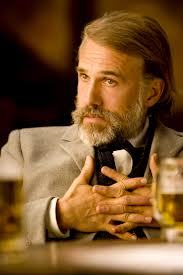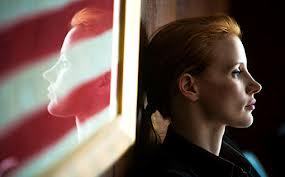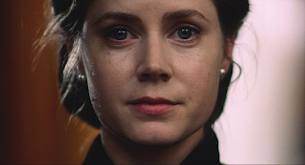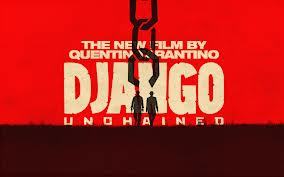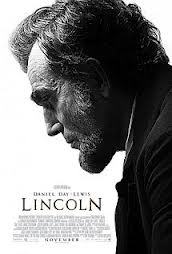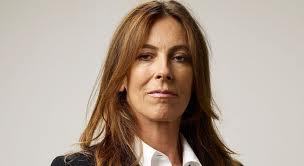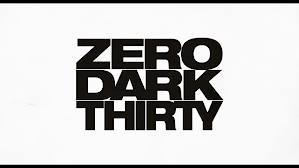After a few minutes in total darkness, surrounded by the sounds of real 9-1-1 calls during September 11th, 2001, we, the audience, are dropped into the middle of an “enhanced interrogation” (torture) of a prisoner. CIA interrogator Dan (Jason Clarke) wants prisoner Ammar (Reda Kateb) to divulge when and where an upcoming attack is going to take place.
Ammar is beaten, bound, water-boarded and deprived of food and water; treated more like an thing than a human being.
He appeals to the only female in the room, Maya (Jessica Chastain), when he tells her, in regards to Clarke’s character “Your friend is a monster.”
There’s a brief moment where it seems like Maya, who is clearly squeamish about these techniques, will take pity on the man. But she simply says: “You can help yourself by being truthful.”
There has been a lot made about the torture in Zero Dark Thirty. Several members of Congress have stated the film is wrong for suggesting that torture lead to discovering Bin Laden’s whereabouts. Members of the Academy Awards have gone on record saying they refuse to vote for the film when it comes time for the Oscars, because it “supports torture.”
The internet is full of people decrying the film as “propaganda” and “pro-torture.”
Every single one of these people is flat-out wrong.
I have to wonder if these naysayers were paying attention during the film, or if indeed they even watched it at all. The controversy over ZDT is entirely fabricated, based on false notions and misunderstanding and rumor.
Director Kathryn Bigelow and writer Mark Boal took great steps to be as accurate as possible in crafting their decade spanning thriller. Indeed, when the film was first being made, Bin Laden was still at large, and the film was mostly the story about how America was failing to get the job done. The actual death of Osama Bin Laden gave the filmmakers a whole new ending to the material, but until that ending, not much changes. The film is still primarily about how badly the CIA was doing, and how it took them so very, very long to finally get Bin Laden.
The filmmakers take a very neutral stance with the story. They don’t hammer home any sort of “message.” There’s no heavy-handed exposition about why the characters are doing what they’re doing. And as such, there aren’t any scenes where characters thoughtfully pause and say “Gee, all this torture is wrong!” Because of this subtle approach, audiences are forced to think for themselves, and that’s not something audiences like to do that often.
The torture that takes place in the film does not lead to any positive results. In fact, after weeks of torturing Ammar, Dan and Maya finally get somewhere only when they start to be nice to the prisoner, offering him food and letting him leave his holding cell. The torture gets them nowhere; instead, Ammar is a complete wreck, unable to offer any useable information, and as a result, the next attack takes place. This alone should be enough to make audiences realize that the film is in no waycondoning torture. It doesn’t come right out and say it, but the message learned from the Ammar portion of the film is this: Torture got us nowhere, let’s try something else.
It’s a little embarrassing that a film like ZDT, which, make no mistake, is a masterpiece, is getting so much flak for something that isn’t even present in the film.
The frontrunner for best picture this year, Argo, also tells of turmoil in the Middle East, and is also based on a true story. However, as countless historians have pointed out, the events in Argo have been so heavily fictionalized that it bares little resemblance to what actually happened. Meanwhile, Zero Dark Thirty has gone to such painful extremes to be as accurate as possible, and people want to crucify the film.
The simple fact of the matter is, just because the characters in the film don’t come out and declare the evils of torture, it doesn’t mean the film supports torture.
It’s not pretty, but the truth is torture was used in real life. To ignore that torture, and act like it never happened—that would be the very definition of propaganda that so many are incorrectly labeling ZDT with. To complain that ZDT depicts torture so brutally would be the equivalent of someone complaining that Schindler’s List featured too many scenes of Jewish people being killed during the Holocaust. These things happened. They are not something to be proud of, but to ignore or overlook them would be a flaw itself.
In an age when few filmmakers are willing to take chances,
ZDT is a film that challenges its viewers. It is the type of film that should be rewarded and studied, not just casually tossed aside because of an incorrect assumption.





